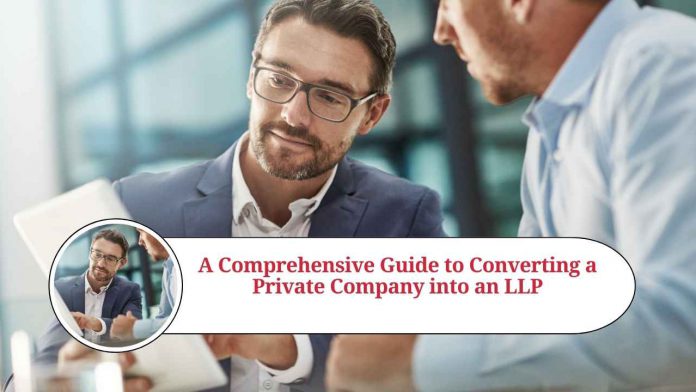Introduction:
Converting a private company into a Limited Liability Partnership (LLP) can be a strategic decision for businesses looking to enjoy the benefits of both corporate structures. While a private company offers limited liability protection and perpetual existence, an LLP combines limited liability with the flexibility of a partnership. In this blog, we will explore the step-by-step process of converting a private company into an LLP and highlight the key considerations along the way.
Understanding the Concept of an LLP:
Before diving into the conversion process, it’s essential to grasp the concept of an LLP. An LLP is a separate legal entity, offering limited liability protection to its partners, unlike a traditional partnership. It allows partners to have flexibility in managing the business and offers a clear distinction between ownership and management roles.
Eligibility Criteria:
To convert a private company into an LLP, it must meet the following eligibility criteria: a. The private company should be a registered entity under the Companies Act, 2013. b. The company should not be listed on any stock exchange. c. All partners of the LLP must be shareholders of the private company at the time of conversion.
Obtain Consent and Approval:
Before initiating the conversion process, it’s crucial to obtain the consent and approval of all shareholders and directors of the private company. A special resolution must be passed in a general meeting, with at least three-fourths of the shareholders’ voting rights in favor of the conversion.
Obtain Digital Signature Certificates (DSCs):
DSCs are required for filing the necessary documents online during the conversion process. The designated partners of the LLP must obtain their DSCs from certified agencies.
Reservation of LLP Name:
Once the consent and approvals are in place, the next step is to reserve a unique name for the LLP. The proposed name must comply with the naming guidelines specified by the Ministry of Corporate Affairs (MCA). An application for name reservation can be filed with the Registrar of Companies (ROC).
Drafting the LLP Agreement:
The LLP agreement outlines the mutual rights, duties, and responsibilities of the partners. It should be prepared in compliance with the LLP Act, 2008. The agreement must be signed by all partners and filed with the ROC within 30 days of conversion.
Application for Conversion:
To convert the private company into an LLP, an application must be filed with the ROC. The following documents need to be submitted:
a. Form 18: Application for conversion
b. Form 2: Incorporation document of LLP
c. Statement of Accounts disclosing the assets and liabilities of the company
d. Consent of all partners e. List of all partners with their consent and details
Issuance of Certificate of Incorporation:
Upon receiving the application and necessary documents, the ROC will review the application. If everything is in order, the ROC will issue a Certificate of Incorporation, confirming the conversion of the private company into an LLP.
Post-conversion Compliance:
After the conversion, certain post-conversion compliance requirements need to be fulfilled, including:
a. Intimating various government departments about the conversion, such as income tax authorities, banks, etc.
b. Updating the company’s registration details, tax registrations, and licenses.
c. Modifying legal documents, such as agreements, contracts, and MOAs, to reflect the new structure.
Tax Implications:
Before proceeding with the conversion, it is crucial to evaluate the tax implications. Consult with a tax professional to understand the potential impact on income tax, capital gains tax, stamp duty, and other applicable taxes. Ensure that the conversion aligns with your tax planning strategies.
Employee Provident Fund (EPF) and Employee State Insurance (ESI):
If the private company has been contributing to EPF and ESI for its employees, it is essential to terminate these contributions after conversion. LLPs have different rules and regulations regarding these social security schemes. Ensure compliance with the relevant laws and notify employees about the changes.
Intellectual Property Rights (IPR):
During the conversion process, it is crucial to transfer any intellectual property rights owned by the private company to the LLP. This includes trademarks, patents, copyrights, and other intangible assets. Execute the necessary agreements and documents to effect the transfer.
Liabilities and Obligations:
Upon conversion, the liabilities and obligations of the private company will be transferred to the LLP. Carefully assess all existing contracts, loans, leases, and agreements to ensure a smooth transition. Notify creditors, debtors, and other stakeholders about the conversion and update relevant documentation.
Compliance with LLP Regulations:
Once the conversion is complete, the newly formed LLP must comply with the regulations outlined in the Limited Liability Partnership Act, 2008. This includes maintaining proper accounting records, submitting annual returns, conducting regular meetings, and adhering to the provisions of the LLP agreement.
Bank Accounts and Licenses:
Inform your bank about the conversion and initiate the necessary steps to update the bank account details. Transfer funds, securities, and other assets from the private company’s bank account to the LLP’s account. Additionally, review all licenses, permits, and registrations held by the private company and update them as required.
Contracts and Agreements:
Review all existing contracts and agreements entered into by the private company. Identify any provisions that may require amendment or termination due to the conversion. Consult with legal professionals to ensure that the necessary steps are taken to modify contracts or enter into new agreements under the name of the LLP.
Communication with Stakeholders:
Effective communication is vital during the conversion process. Notify employees, suppliers, customers, and other stakeholders about the conversion and provide them with updated contact information. Assure them of a seamless transition and address any concerns or queries they may have.
Professional Assistance:
Converting a private company into an LLP involves various legal, financial, and administrative aspects. It is advisable to seek professional assistance from lawyers, accountants, and company secretaries who specialize in corporate conversions. They can guide you through the process, ensuring compliance and minimizing any potential risks or complications.
Conclusion:
Converting a private company into an LLP offers several advantages, including limited liability protection and operational flexibility. However, it is essential to follow the prescribed procedures and fulfill all the necessary compliance requirements. By understanding the step-by-step process outlined in this blog, businesses can successfully navigate the conversion process.
Frequently Asked Questions (FAQs)
Q: What is the key advantage of converting a private company into an LLP?
A: The primary advantage is the combination of limited liability protection and the operational flexibility of a partnership structure.
Q: Can any private company be converted into an LLP?
A: No, only private companies registered under the Companies Act, 2013 and meeting specific eligibility criteria can be converted into an LLP.
Q: What is the process for converting a private company into an LLP?
A: The process involves obtaining consent and approval from shareholders and directors, reserving a unique name for the LLP, drafting the LLP agreement, and filing an application with the Registrar of Companies.
Q: Are there any tax implications when converting a private company into an LLP?
A: Yes, there may be tax implications. It is advisable to consult with a tax professional to understand the potential impact on taxes, such as income tax and capital gains tax.
Q: What happens to the assets and liabilities of the private company during the conversion?
A: The assets and liabilities of the private company are transferred to the LLP upon conversion. It is important to assess and manage these assets and liabilities during the process.
Q: Can employees’ Provident Fund (EPF) and Employee State Insurance (ESI) contributions continue after conversion?
A: No, EPF and ESI contributions made by the private company need to be terminated after the conversion. LLPs have separate regulations regarding these social security schemes.
Q: How long does it take to complete the conversion process?
A: The duration can vary depending on factors such as the efficiency of document preparation, government processing time, and compliance with requirements. It generally takes a few weeks to complete the conversion.
Q: Do I need to notify stakeholders about the conversion?
A: Yes, it is important to inform employees, suppliers, customers, and other stakeholders about the conversion. Provide them with updated contact information and assure them of a smooth transition.
Q: Can the LLP agreement be modified after the conversion?
A: Yes, the LLP agreement can be modified post-conversion. However, any changes must comply with the provisions of the LLP Act, 2008, and require the consent of all partners.
Q: What post-conversion compliance requirements should be fulfilled?
A: Post-conversion compliance includes updating registrations, licenses, bank accounts, and contracts. Additionally, intimation should be given to government departments, such as income tax authorities and banks, about the conversion.




















